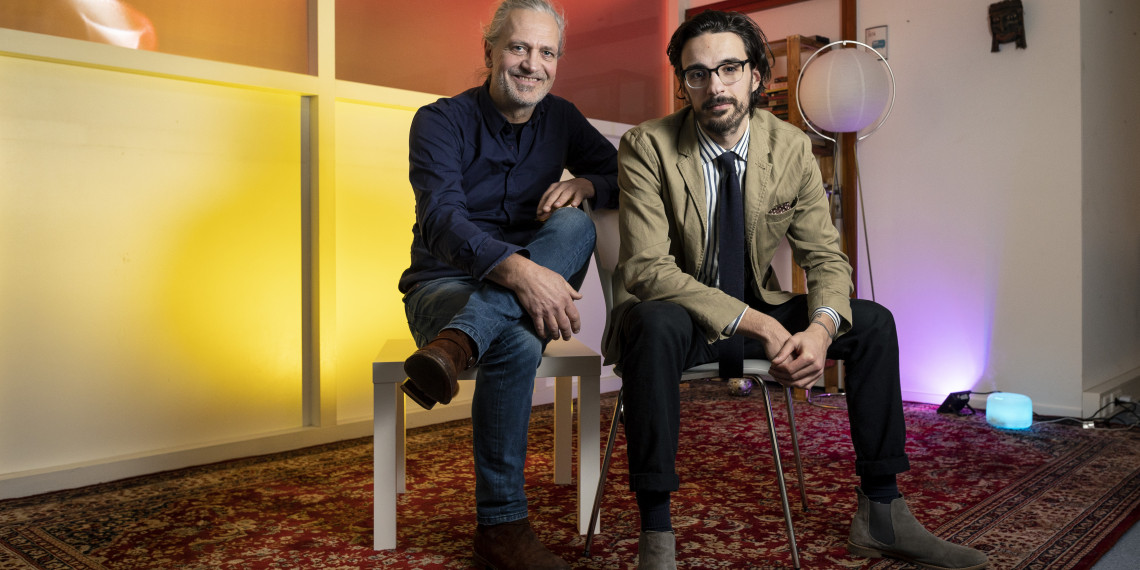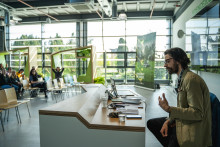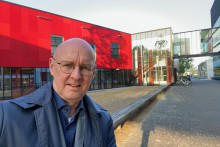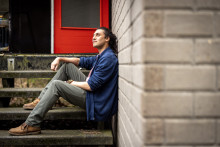You can find the home base of The Collective Unconscious on the second floor of the Bastille. The former ‘red desk’ and offices of the UT student psychologists have made room for a kind of meditation space. It’s a room with carpets on the floor, plants and lamps in the corners and a modest bookcase. In the background, relaxing music is playing non-stop. ‘It’s a place where you can find peace and tranquillity,’ says Robert Wendrich, a UT researcher and teacher at Industrial Design Engineering. He’s part of the collective and compares the meditative space in the Bastille to a ‘nice, comfortable womb’.
Austin Piedmont is the founder of the collective and a former Psychology student. ‘We know we have a temporary space here, since renovations are coming up. And the facilities we have are kind of gathered together. Lately, we’ve been able to purchase some extra stuff because a local yoga studio went bankrupt. It’s a start, I know. But I hope this can lead to something bigger.’
Master your mind
The reason for Piedmont to start the collective stems from his time as a Psychology student, a study he quit after a semester. ‘When I enrolled, I was so excited. But the enthusiasm quickly faded. We learned all kinds of things about mental health, but I had no idea how to apply these concepts to myself. I learn much better by using tools and direct experience, rather than regurgitating memorized material. So, I quit.’
'We spend billions of dollars on getting out of our own heads'
With that in his mind, Piedmont started The Collective Unconscious last year, together with his wife Julia. ‘To offer a place where people first learn how to master their own minds, before teaching the world to master theirs.’ To achieve this, Piedmont is looking into altered states of consciousness. ‘We spend billions of dollars on getting out of our own heads.’ A lot of people have no idea that they’re working on that unconsciously: albeit by drinking coffee or beer, scrolling through social media, riding a rollercoaster or watching porn. Maybe these activities make us happy, but more often than not, they leave us feeling emptier or worse.’
That’s why Piedmont thinks that we should look into ways to enter our heads, instead of getting out of them. ‘In short, this includes everything beyond our normal mode of thinking. To get to the place where you’re a more present, mindful, open, effective and compassionate human being. Ron Siegel, a renowned biologist at UCLA, says that our drifts to alter our own consciousness can be seen as our fourth evolutionary drift, next to food, health and reproduction. I couldn’t agree more.’
Different doors
Piedmont says there are different methods and tools available to alter our consciousness, like meditation. Since last month, the collective has been offering a variety of workshops and get-togethers, like ‘Deep connection for couples’, a ‘Wednesday Women’s Circle’ and ‘Coffee Shop Philosophy’. Bastille 207 also hosts a weekly meditation session on Monday, with ten to fifteen participants on average. ‘If someone can deeply focus by listening to music, by all means go for it. But you can also solve problems by not putting your headphones on and sitting on a pillow in silence,’ says Wendrich. ‘And it’s important to realize that it’s okay to do so. More often than not, I see a kind of dogmatic petrification when people are confronted with things like meditating and mindfulness. Either they’re afraid of what they will find or they’re not capable of looking beyond their own reality.’
'You must not confuse us with a coffee shop where you can get your own substances'
But the range of tools doesn’t stop with meditation, says Wendrich. ‘You must not confuse us with a coffee shop where you can get your own substances, but we do want to explore the effects of psychedelics on the consciousness. That would take place in a safe, controlled environment and by microdosing.’ Piedmont adds: ‘Be it by meditating, psychedelics or light therapy, they’re all different doors that lead you to the same room and state of mind.’
Psychedelics
Psychedelics - also known as serotonergic hallucinogens - are psychoactive substances that produce alterations in perception, mood and numerous cognitive processes. Examples of these substances are LSD, MDMA, magic mushrooms and DMT.
‘Drinking dungeons’
Wendrich says it’s ‘unique’ that the collective has found its place at the university. He’s aware of the social taboos surrounding drug use, while the collective openly flaunts it on its website. ‘In the United States, young black people are being mass-incarcerated. Even in Europe you easily get a criminal record. In the Netherlands, we’re relatively lenient, but when it comes to drugs, we’re more of a control state than a social democracy.’
The UT researcher thinks it’s about time to curb taboos. ‘The war on drugs has been going on since the seventies and is mostly based on stigmas and ignorance. A university is eminently suited to get this theme up for discussion and experimentation. And let’s face it: next to the A35, there is a beer factory with pipes leading directly to the ‘drinking dungeons’ of the study associations, so to speak. That’s something we choose to accept. Why don’t we think it’s acceptable to use psychedelics, with a human, holistic and responsible approach?’
'To us, it’s not about using drugs, but finding out the usefulness and risks of substances in an objective and unbiased way'
Piedmont puts in his two cents. ‘One of our sponsors is the Global Drug Survey. According to their research in 2017, psychedelics are rated as the safest drug. Compare that to alcohol being involved in three out of five violent crimes in the United States. Another example: compare the personal and social harm alcohol causes to the public opinion and it scores way higher than psychedelics. It leads you to question what you think is important: societal taboos or a scientific approach. To us, it’s not about using drugs, but finding out the usefulness and risks of substances in an objective and unbiased way.’
Psychological issues
According to Wendrich, drugs have a lot of potential to help people and scientists are making their use more visible and proven. ‘For instance, we know of medicinal marihuana and cannabis oil that they can help cancer patients to relieve physical ailments. And over at Imperial College London, researcher Robin Carhart-Harris is making strides in testing LSD and psilocybin (magic mushrooms, ed.) on patients. Apparently, these substances are extremely effective in helping people with anxiety disorders, depression and even alcoholism.’
'I think that every building on campus needs a spiritual meditative space'
To Wendrich, Carhart-Harris’ findings are ever more reason to have the UT as the cradle for The Collective Unconscious. ‘All these quality agreements from the government are being offloaded on students. It’s no secret they buckle under stress, depressions and burnouts. You can add concentration issues to the list. I hear of students openly talking about using Ritalin, for example, to better perform during exams. So, in short: there are psychological problems and there is an evident call for help. That’s why we need places to come to our senses. In fact, I think that every building on campus needs a spiritual meditative space, just like in the Bastille. And subsequently, outside the campus. These problems don’t just stop at our students, but are symptomatic for our entire society.’
Deeper layer
Wendrich himself sees a lot of potential in psychedelics helping people to be more creative. ‘In my research, I focus on design tools and ideation processes. In a process like that, it’s important to pull people out of their own shame and to externalize their thoughts. That’s why I’ve written a research proposal, aimed to have a group under the influence of psychedelics go through a design process – and to compare that with a control group. The premise is that psychedelics help people to get obstacles out of the way and reach a fundamentally deeper layer in themselves. You could call it a creative push.’
‘Anything but hippies’
And the dangers? ‘We definitely don’t want to close our eyes to those,’ Piedmont says. ‘We don’t use drugs here as of now – although several kinds are legal in the Netherlands. But if we use them, it will have to be in the right setting and with the right substances. While the chance of bodily harm or of addiction is virtually none, there is a small risk of harming your mental well-being. If you're not prepared, don't know the possible effects, or have a history of mental illness, then having the feeling that reality is melting away might not go over so well. That’s why it’s incredibly important for us to create the right expertise and setting.’
Input specialist Marloes Postel: ‘Less enthusiastic about psychedelics’
Marloes Postel is an assistant professor at the Psychology, Health & Technology research group and senior researcher at Tactus Addiction Treatment.
‘I think it’s very good that there is attention for improving the well-being of students, through the use of meditation and technology. I am less enthusiastic about the use of psychedelics for this. I can imagine scenarios in which people use psychedelics as an extreme resort, but I would not promote it among students as a 'way of being in the head' among students.
Even though a number of studies show promising results, these studies are small and often no use is made of a control group or placebo. Based on these studies, no definitive conclusion can be drawn or generalized to larger groups.
There is a risk that especially vulnerable students are interested in participating and you can argue whether that is desirable. In addition, there are the risks of the product itself, because dosing is difficult and it cannot be predicted how an individual will respond to the drug. With a strict screening, safe environment and expert guidance, the risks of psychedelics can be limited. This includes thinking of testing the drug, use within a strictly regulated clinical setting and not using it when predisposed to psychosis. Caution should certainly be exercised.
If you want to be more mindful or compassionate in life, I would advise you to choose a safe method like meditation or yoga, or to use supportive technology, such as an app or biofeedback.’
Before the interview is over, both gentlemen want to stress one more thing. ‘We are anything but hippies in a cult, like in the sixties,’ Piedmont says. Wendrich nods. ‘I’ve lived through that era. And we’ve learned enough good and bad lessons from it.’ Piedmont: ‘So now, we’ll continue building a central hub, without bias and looking for the proper tools to help people improve their mental health. Yes, I truly believe we can help anyone, but first we need to start having honest conversations about what it takes to do that.’







